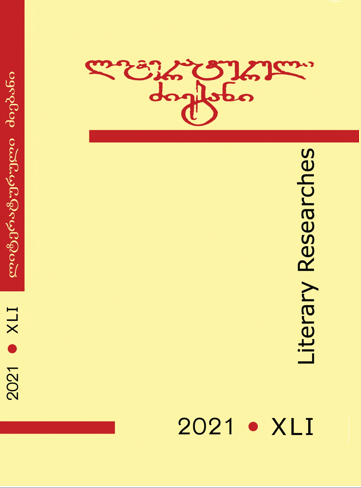Salvation of Faust’s Soul and Goethe’s Concept of Ascension to Heaven and for the Intertextuality of the Final of the Tragedy
Published 2021-12-20
Keywords
- Goethe,
- Faust,
- Mephistopheles,
- Salvation,
- Intertextuality
How to Cite
Abstract
The finale of Faust and its intertextuality is a result of several theological texts, in particular the work by the third-century Christian theologian Origen of Alexandria, who later was declared as a heretic by the church, (c. 185-252) Apokatastasis Panton (“Restoration of Everything”). It is according to the basic concept of the text that the a priori ascension of Faust and the liberation/salvation (German: Erlösung, Rettung) from the earthly, material element (represented by Mephistopheles) can be explained. In particular, the main concept of the work of Origen is that every creature returns by force of necessity back to the parental entrails, the principle that comes from the father, or the first, returns to the first, since the relationship between God the Creator and his creatures is based on the universal (Schmidt 2011:286). The choir of angles through their singing gives a swift hint on this issue: “Gathered together, Rise now, and praise! Spirit can breathe here, In purer waves!” („Alle vereinigt/Hebt euch und preist,/Luft ist gereinigt/Atme der Geist“) [V. 11820-11824]. (Goethe 2001: 210)
The second source for the intertextuality of Faust’s finale is made up of philosophical texts, namely Plato’s Symposium and the concept of Eros, which contrasts with the Christian agape, or the concept of Christian brotherly love: according to Plato, the philosophical talent of the cognition of divine elements comes from Eros, the spiritual love towards them and the striving towards them; Eros is the spiritual force of cognition and philosophical contemplation (Metzler… 2008: 160). That is why it is on the basis of Platonic Eros that the soul of Faust is liberated from Mephistopheles, that is, from the earthly-material, “impure” elements, and results into his ascension to heaven, because Eros gives Faust’s spirit (entelechy) the power to rise above earthy, from the sphere of empirical to heavenly, in the dimension of non-material sphere. It is from the Eros that settles in the dead Faust, namely, in the “noble part” (“edles Glied”) of his anthropological essence, or in his immortal, eternal soul “divine sensations and feelings” (“göttliche Gefühle”), “excitement” (“entzückt”), “Holy Love” (“Heilige Liebeslust”), “glowing love bonds” (“glühendes Liebesband”), it is Eros that serves as the “foundation of eternal love” (“ewiger Liebe Kern”). That is why Mephistopheles, who is the symbolic embodiment of Faust’s unconscious longings and the bodily-material part of Faust’s anthropological essence, is powerless to conquer Faust’s soul from the very beginning, and as soon as Faust dies is swallowed by “Eternal emptiness” (“Das Ewig-Leere”).
Thus, Eros – the divine striving, the spiritual striving – gives Faust’s soul the ability to contemplate the divine eternal ideas and guides his soul to contemplate the divine absolute beauty; Eros gives Faust the power to establish himself in the eternal womb of the feminine. Therefore, in the finale of “Faust”, it is the Platonic type of Eros that is the ascending, accelerating force with which the soul of the dead Faust is filled when ascending to heaven, and thus is given the ability to strive („streben“), because it is the nature of Eros to aspire.
Faust’s salvation in the finale of the tragedy, apart from the Platonic concept of Eros, is based on the concept of Aristotelian entelechy and Leibniz’s Monadology: namely, the principle of entelechy, thus due to constant action (Tätigkeit) of inner contemplation and strive (streben) Faust is to ascend to heaven and overcome the earthly-material being, because in the anthropological essence of Faust (thus in every human being) the Spirit (German: Seele) is given, which is a non-stoppable energy, force, which is constantly striving to rising and ascend and thus towards perfection.
In this case, the entelechy in Faust’s essence (in Goethe’s words action/Tätigkeit, and strive/streben) a priori urges Faust’s soul to rise above earthly and thus take Faust’s essence to new existential and ontological dimensions. Thus, salvation of Faust’s Soul (which does not imply the establishment of transcendence through repentance and remorse for sins, which K. Gamsakhurdia described as “the search for a non-divine God”), is due to the entelechy of his soul, which as an inner spiritual force (German: „Kraft“) enables him to reach high, divine existence and overcome the earthly, low existence.
Thus, it is in Goethe’s artistic-creative rethinking of the concepts of Eros and Entelechy that Faust’s main ideological conception emerges, which is, in fact, Goethe ontological-existential vision and his understanding of human anthropological essence: in particular, The motive for salvation, in which Goethe rejects the ecclesiastical teaching of man’s a priori sinfulness and atonement for these sins, while the “Faustian” concept of salvation itself implies liberation from the earthly, material, perishable element; On the other hand, in the controversy between the bodily-physiological (or “Mephistopheles”) and spiritual beginnings given in the human essence,according to Goethe, the spiritual beginning wins from the very beginning, which is already is associated with `entelechy’’ and “eroticism” (full of Eros) embedded in human essence (see above, “eroticism”, love, fondness as the unquenchable desire of the cognitive subject to contemplate higher ideas and the love shown by the cognitive subject for these ideas). In the anthropological essence of man, the a priori victory over the bodily (earthly) beginning of the spiritual (heavenly) beginning is symbolically embodied in the ascension of Faust (which is a priori in nature), by his establishment of the eternal feminine entrails, and in the inevitable defeat of Mephistopheles, which is based on the divine Eros emanating from the eternal feminine entrails and the individual entelechy of Faust himself, his anthropological entelechy, the always aspiring, effective inner essence.

